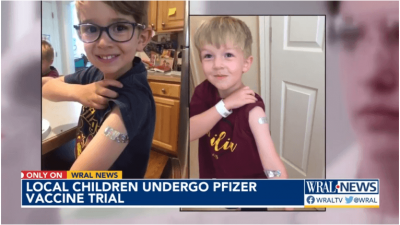CDC Admits Teens Vaccinated With Pfizer or Moderna at Higher Risk of Heart Inflammation

In guidance quietly updated June 1, the Centers for Disease Control and Prevention said there is a higher-than-expected number of cases of myocarditis among young teens after the second dose of an mRNA COVID vaccine.
Based on a May 24 report from the CDC’s Advisory Committee on Immunization Practices (ACIP) COVID-19 Vaccine Safety Technical Work Group (VaST), the CDC on June 1 updated its website with the following language:
“Data from VAERS [Vaccine Adverse Events Reporting System] show that in the 30-day window following dose 2 mRNA COVID-19 vaccination, there was a higher number of observed than expected myocarditis/pericarditis cases in 16–24-year-olds.”
The updated language differed significantly from the CDC’s statement two weeks earlier, which said rates of myocarditis were not higher among vaccinated people.
On May 17, the ACIP said it was investigating reports of myocarditis and pericarditis occurring after mRNA COVID vaccine — particularly in adolescents and young adults — that seemed to occur more often in males than females, more often following the second dose and typically within four days after vaccination. Most cases appeared to be “mild.”
The CDC’s VaST Work Group originally said its monitoring systems had not found more cases of myocarditis than would be expected in the population, but members of the committee on vaccinations said healthcare providers should be made aware of the reports of the “potential adverse event.”
On May 26, the CDC announced it was investigating 18 reports of heart inflammation in recently vaccinated teens in Connecticut who received a COVID vaccine. All 18 cases resulted in hospitalization.
A study published June 4 in the journal Pediatrics reported seven boys between the ages of 14 and 19 were hospitalized for heart inflammation and chest pain within four days of receiving the second dose of Pfizer’s COVID vaccine, The Defender reported. None of the teens were critically ill, but all were hospitalized.
Only one of the seven boys in the Pediatrics report displayed evidence of a possible previous COVID infection, and doctors determined none of them had a rare inflammatory condition linked with COVID or pre-existing conditions.
The study’s authors concluded it is possible myocarditis or pericarditis may be an additional rare adverse event related to systemic reactogenicity, but “No causal relationship between vaccine administration and myocarditis has been established.”
As The Defender reported today, the Oregon Health Authority has confirmed at least 11 cases of myocarditis or pericarditis — inflammation of the sac surrounding the heart — in all age groups following COVID vaccination.
The latest data from the CDC’s Vaccine Adverse Events Reporting System (VAERS) showed 40 casesof heart inflammation in the 12-17 year adolescent age group reported after COVID vaccination — all associated with Pfizer.
On June 2, Israeli health officials found a “probable” link between Pfizer’s COVID vaccine — which the country has relied on almost exclusively in its vaccination drive — and dozens of cases of heart inflammation in young men following the second dose.
After the ministry received reports of heart inflammation, including myocarditis, following recent COVID vaccination, a panel of experts were appointed to investigate the issue
In a statement, Pfizer said there is still no indication the cases are due to its vaccine. Myocarditis is often caused by viral infections, and COVID infections have been reported to cause the condition, the drugmaker said.
Pfizer’s partner, BioNTech, said more than 300 million doses of the COVID vaccine have been administered globally and the “benefit-risk profile” of the vaccine remains positive.
“A careful assessment of the reports is ongoing and it has not been concluded,” the company said. “Adverse events, including myocarditis and pericarditis, are being regularly and thoroughly reviewed by the companies as well as by regulatory authorities.”

